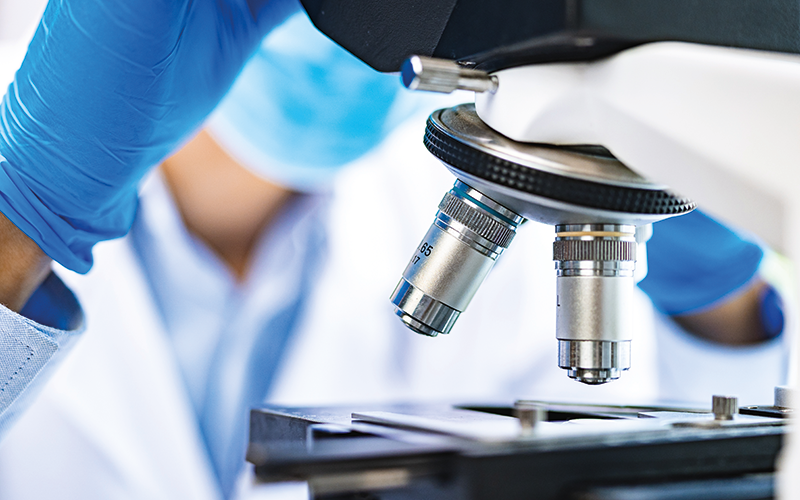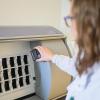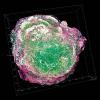Sarah May, IBMS Deputy Chief Executive, and Chris Ward, IBMS Head of Examinations, outline the launch of new limited-scope scientist reporting qualifications.

It is widely recognised that there are severe medical workforce shortage issues within histopathology. This has been caused by a variety of factors including the lower than optimal fill rate of training posts, a significant proportion of the pathologist workforce retiring and an increased demand for histopathology services. Evidence gathered by the Royal College of Pathologists (RCPath) indicates that the number of histopathology requests to laboratories has increased by 4.5% on average, year on year, since 2007.
In anticipation of this situation, RCPath and the IBMS started work on a project in 2010 that aimed to train scientists to report gastrointestinal and gynaecological histopathology specimens. The confidence in commencing this initiative was built on the already established success of scientist reporting within the cervical screening programme, which has seen trained and qualified scientists employed to report abnormal cervical smears since 2001. The first group of histopathology reporting scientists were recruited onto a training programme in September 2012.

The success of the training initiative led to the creation of a formal conjoint board in 2014 and a fully established training programme. By 2016 the assessment process was fully absorbed into the RCPath examinations department, which means that the Stage A and Stage C Examinations are set and assessed by RCPath examiners in parallel with examinations for medically qualified trainees. This important step provides assurance over the validity of the qualifications. The success of these two initial pathways led to the creation in 2017 of the dermatopathology pathway.
Since the launch of the reporting qualifications the number of individuals undertaking them has continued to grow. There are now 65 scientists from across the four UK nations undertaking the different pathways on various stages of the qualification, including 16 in the final stage D. A total of 18 candidates have been awarded the Certificate of Completion and are now qualified to report in their chosen specialism.
The numbers undertaking the reporting qualifications have continued to grow
The importance of training scientists to be part of the histopathology reporting team is recognised and welcomed by the respective UK health departments. Such is the confidence of NHSE that, through the National School of Healthcare Science, the employers of IBMS members undertaking these qualifications in England can claim up to £9000 per candidate to support the training of these individuals.
New limited-scope reporting qualifications
A 2020 report from Cancer Research UK suggested a significant staff increase was needed across cancer-related professions to meet Health Education England’s (HEE’s) aim to provide a world-class services for cancer patients by 2029. Separate evidence from Cancer Research UK states that every year over 40,000 cases of bowel cancer are diagnosed in the UK, with most of these diagnoses made on diagnostic biopsies taken at colonoscopy. The targets for bowel screening mean there is an increasing demand for colonoscopies and therefore an increasing number of biopsies sent for diagnosis, requiring an increase in the number of appropriately qualified individuals to undertake the biopsy reporting.
In September 2021 the Getting It Right First Time Programme National Specialty Report on Pathology highlighted the issues faced by the current pathology workforce and strongly advocated organisations look at ways to upskill appropriate non-medical staff groups and create a diverse and flexible workforce to meet current and future demands.
The IBMS has long recognised that HCPC-registered scientists are highly qualified and experienced individuals and that through an appropriate training programme, and working alongside other healthcare professionals, they can contribute to safely managing the increasing workload within histopathology.
This thought, together with published reports and other sources of information, led the conjoint board to work on creating two new limited-scope qualifications aimed specifically at those reporting cervical and bowel biopsies from the respective screening programmes. Reporting in the NHS screening programmes is highly regulated and driven by clear protocols and guidance. This puts scientists in a strong position to be trained to report these specimens and help the programmes meet turnround time targets. These two new qualifications have been endorsed by the leads of the respective cancer screening programme and both the IBMS and RCPath Councils.
To undertake either of these new qualifications, applicants must be an HCPC-registered biomedical or clinical scientist, have member (MIBMS) or fellow (FIBMS) status of the IBMS and a minimum of five years of post-registration experience. Full eligibility criteria are available on the IBMS website, but of key importance is the need for departmental support and a commitment from their trust to provide both an educational supervisor and clinical supervisor to provide that support for the applicant through the training period. Coupled with this should be the understanding that on successful completion of training the candidate will become a member of the histopathology reporting team.
These new qualifications, which are being launched in May, comprise a Stage A, which will be assessed through the submission of a portfolio and an objective structured practical examination (OSPE)-style end-point assessment and then a second preceptorship stage that will be assessed through the submission of a portfolio. Successful completion of both stages will enable candidates to report a clearly defined narrow range of specimens independently. Employers of trainees in England will be able to claim £3000 to support the training of those undertaking either of these qualifications.
The future
The conjoint board recognises that it has more work to do in promoting the reporting qualifications and opportunities and benefits they provide, not just to scientists but to employers and ultimately patients. The conjoint board will continue to explore what further pathways may be appropriate to develop to help address increasing workload pressures.
If you are interested in undertaking any of the reporting qualifications, please contact the IBMS Head of Examinations Chris Ward via [email protected]
Image credit | Shutterstock




